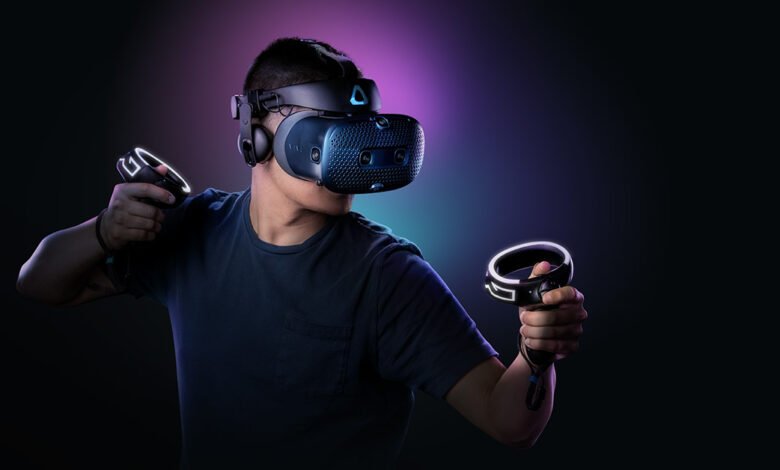The Metaverse Revolution in 2023: Redefining Virtual Reality

In recent years, the concept of the Metaverse has gained significant attention, promising to redefine our virtual reality experiences. With technological advancements and an increasing demand for more immersive and interconnected virtual worlds, the Metaverse has emerged as a revolutionary concept in 2023.In this article we will explore the metaverse revolution in 2023 redefining virtual reality
The Metaverse refers to a collective virtual shared space, a convergence of physical and virtual reality, where users can interact with a computer-generated environment and other users in real-time. It goes beyond the limitations of current virtual reality (VR) technologies, offering a seamless and interconnected virtual experience.
In 2023, the Metaverse has become a hot topic, capturing the imagination of technology enthusiasts, businesses, and researchers alike. It holds the potential to reshape how we interact with digital environments, revolutionize various industries, and even redefine social interactions.
Read more: Unlocking the Potential of the Metaverse: The Future of Social Interaction IN 2023!
Evolution of Virtual Reality

To understand the significance of the Metaverse, it’s important to trace the evolution of virtual reality. VR technology has come a long way since its inception. From the first rudimentary attempts at immersive experiences to the current state-of-the-art headsets and simulations, virtual reality has evolved significantly.
However, despite the advancements, current VR technologies still have their limitations. They often require expensive equipment, are limited to individual experiences, and lack seamless interactions with other users. The Metaverse aims to address these limitations and provide a more holistic and immersive virtual experience.
Understanding the Metaverse
The Metaverse can be defined as a collective virtual shared space that is entirely interconnected, accessible through various devices and platforms. It is characterized by its vastness, persistence, and scalability. Users can explore and interact with this virtual realm using avatars, objects, and environments, providing a sense of presence and social presence.
Key components of the Metaverse include a network infrastructure, user interfaces, virtual objects, and social interactions. Existing platforms like Decentraland, Roblox, and Fortnite offer glimpses of the Metaverse’s potential, but the true realization of the concept is still in progress.
The Metaverse Revolution
The Metaverse revolution is fueled by various technological advancements that are reshaping the virtual reality landscape. These include the integration of augmented reality (AR) and VR, advancements in haptic feedback systems, and the development of high-speed and low-latency networks.
With augmented reality, the boundaries between the physical and virtual worlds blur, allowing users to overlay digital information onto the real world. This integration enhances the immersive nature of the Metaverse, enabling users to interact with virtual objects in their physical surroundings.
The impact of the Metaverse is not limited to gaming and entertainment. It has the potential to transform various industries, such as education, healthcare, and business. In education, the Metaverse can provide immersive learning experiences, enabling students to explore historical events or simulate scientific experiments. In healthcare, it can be used for training medical professionals or even providing remote consultations.
Challenges and Concerns
While the Metaverse holds immense promise, it also comes with its fair share of challenges and concerns. Privacy and security issues arise as users spend more time in virtual environments, sharing personal information and interacting with others. It becomes crucial to develop robust privacy frameworks and secure platforms to safeguard user data.
Ethical considerations also come into play. As the Metaverse evolves, questions regarding the ownership and control of virtual assets, the impact on real-world economies, and the potential for addiction and escapism need to be addressed.
Additionally, the digital divide poses a challenge to the widespread adoption of the Metaverse. Not everyone has equal access to the necessary devices, internet connectivity, or the skills required to navigate virtual environments. Bridging this gap is essential to ensure inclusivity and equal opportunities in the Metaverse.
Opportunities and Benefits
The Metaverse opens up exciting opportunities and benefits across various domains. Enhanced social interactions and collaborations are at the forefront, allowing users to connect with friends, family, or colleagues in virtual spaces, regardless of geographical distances. It enables shared experiences, fostering a sense of community and belonging.
Entertainment and media consumption undergo a transformation in the Metaverse. Users can attend virtual concerts, explore immersive storytelling experiences, or participate in interactive game worlds. The boundaries between creators and consumers blur, giving rise to new forms of entertainment and monetization models.
In the realm of education and training, the Metaverse offers unparalleled opportunities. Imagine learning complex subjects through interactive simulations, exploring historical periods through virtual time-travel, or training employees through realistic virtual environments. The Metaverse can revolutionize how we acquire knowledge and develop skills.
Future of the Metaverse

Predicting the future of the Metaverse is a challenging task, as it involves a delicate balance between technological advancements, user adoption, and responsible development. Speculations range from a fully immersive virtual reality experience indistinguishable from the physical world to a more augmented reality-oriented Metaverse, seamlessly integrating digital elements into our daily lives.
The impact of the Metaverse on society and human experiences cannot be ignored. It has the potential to redefine social norms, reshape the way we work, entertain, and learn, and even challenge our perception of reality. However, responsible development and user empowerment are essential to ensure that the Metaverse benefits humanity as a whole.
Read more: Unlocking the Potential of the Metaverse: The Future of Social Interaction IN 2023!
Conclusion
The Metaverse revolution in 2023 represents a significant milestone in the evolution of virtual reality. It promises a future where virtual and physical worlds seamlessly converge, providing immersive and interconnected experiences. While challenges and concerns exist, the potential benefits of the Metaverse across industries and social interactions are immense. It is crucial to embrace responsible development and ensure user empowerment to shape the Metaverse into a force for positive change.
FAQs
What is the difference between virtual reality and the Metaverse?
The Metaverse goes beyond virtual reality by offering a collective virtual shared space that is interconnected, persistent, and scalable. It allows users to interact with a computer-generated environment and other users in real-time, providing a more immersive and holistic experience compared to traditional virtual reality.
How will the Metaverse affect the gaming industry?
The Metaverse has the potential to revolutionize the gaming industry by providing more immersive and interconnected gaming experiences. Players can engage in shared virtual worlds, collaborate with others, and explore interactive environments, transforming gaming into a social and collaborative activity.
Can anyone access the Metaverse?
In theory, anyone can access the Metaverse, but the practicality depends on factors such as access to the necessary devices, internet connectivity, and skills required to navigate virtual environments. Bridging the digital divide is essential to ensure inclusivity in the Metaverse.
What are the privacy concerns surrounding the Metaverse?
Privacy concerns in the Metaverse arise due to increased interactions and sharing of personal information in virtual environments. Safeguarding user data, developing robust privacy frameworks, and ensuring secure platforms are essential to address these concerns.
How can businesses benefit from the Metaverse?
Businesses can benefit from the Metaverse in various ways. It opens up new avenues for immersive advertising and branding experiences, allows for virtual product demonstrations, and enables virtual collaborations and meetings. The Metaverse also presents opportunities for creating unique customer experiences and exploring innovative business models.











